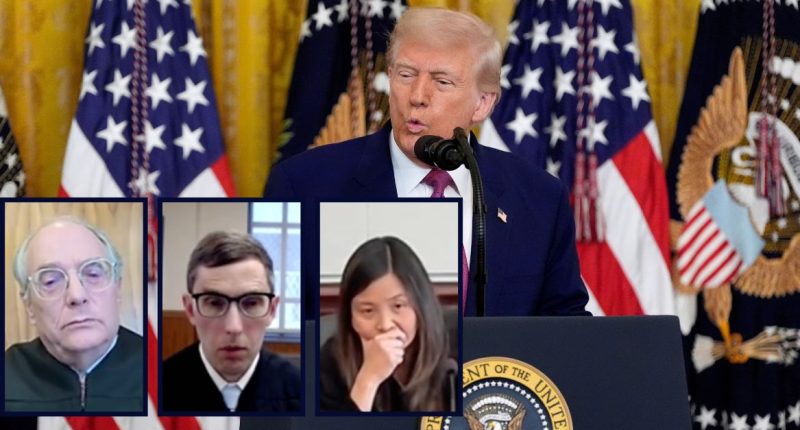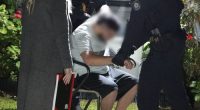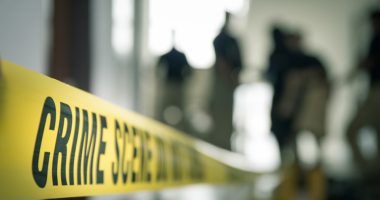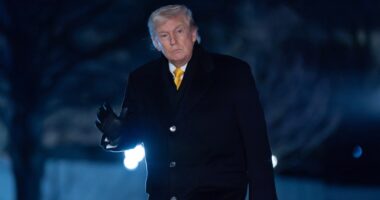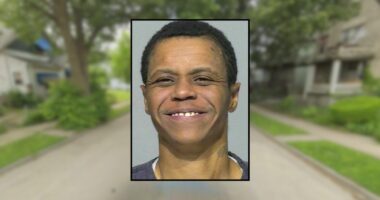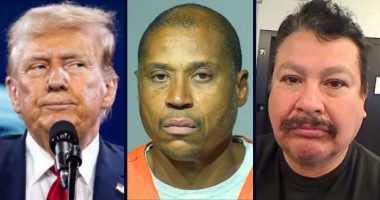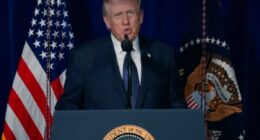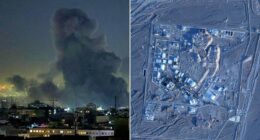Share this @internewscast.com
The inset features, from left to right: U.S. Circuit Judges Mark Bennett, Eric Miller, and Jennifer Sung (YouTube/9th Circuit). The backdrop shows President Donald Trump speaking at an event where he signed a bill to overturn California’s regulation prohibiting the sale of new gas-powered vehicles by 2035. This event took place in the East Room of the White House on Thursday, June 12, 2025, in Washington (AP Photo/Alex Brandon).
In a session held on Tuesday at the 9th Circuit U.S. Court of Appeals, the Department of Justice requested an urgent injunction from a panel of three judges to halt a lower court’s decision. They advocated for the Trump administration’s ongoing deployment of the California National Guard in Los Angeles. The argument presented suggested that a president’s decision to federalize militia operations should not be subject to court scrutiny, even if forces from every state, including Washington, D.C., were mobilized at once.
The hearing was overseen by U.S. Circuit Judges Mark Bennett and Eric Miller, both of whom were appointed by President Donald Trump, alongside Jennifer Sung, who was appointed by President Joe Biden. The proceedings commenced at noon Pacific Time.
At the start, DOJ Assistant Attorney General Brett Shumate took the position that U.S. District Judge Charles Breyer’s currently administratively stayed order, which found a constitutional violation, “interferes with the president’s commander-in-chief powers based on an erroneous interpretation of the applicable statute,” namely 10 U.S. Code § 12406.
That statute says that the president “may call into Federal service members and units of the National Guard of any State in such numbers as he considers necessary” when there is a foreign invasion or a danger thereof, when there is a rebellion or a danger thereof, or when the president is “unable with the regular forces to execute the laws of the United States.”
Shumate asserted that Breyer’s order must be stopped because it “upends the military chain of command,” “gives state governors veto power over the president’s military orders,” “puts Article III judges on a collision course with the commander-in-chief,” and ultimately “endangers lives.”
The DOJ attorney emphasized that “sustained mob violence” in response to ICE raids is “no ordinary civil unrest,” claimed that it is ongoing, and asserted that such violence is “expressly aimed at preventing federal officers from enforcing federal law,” supporting Trump’s federalization of the Golden State’s National Guard.
“Unfortunately, local authorities are either unable or unwilling to protect federal personnel and property from the mob violence ongoing in Los Angeles today,” Shumate said. “Under these conditions, the president acted well within his discretion in calling up the Guard. Based on his determination that the violent riots in Los Angeles constitute a rebellion against the authority of the United States and rendered him unable to execute federal laws.”
As Shumate suggested that Breyer “improperly second-guessed” Trump, Bennett jumped in to ask what the limits of Trump’s discretion are and what role, if any, the courts have in adjudicating this issue.
“Our view is that this statute commits the decision whether to call up the forces to the president’s unreviewable discretion,” Shumate answered. “So no, there’s no role for the court to play in reviewing that decision.”
Bennett followed up with a lengthy question.
“Is it your view that if the president or a future president simply invokes the statute, gives no reasons for doing it, provides no support for doing it, and there is nothing which would appear to a court to justify it, that the court still has no role at all in determining whether the president — this hypothetical future president — correctly invoked subsection 3 [of the statute], no role at all even if the president gives no reasons, and there are no facts offered by that president to support that’s president’s decision?” he asked.
“That’s correct,” Shumate replied, “because if the statute is unreviewable, it’s unreviewable.”
Bennett, picking up on a hypothetical advanced by his colleague Miller, wanted to hear the DOJ’s answer on whether a future president could call upon the National Guard of all 50 states plus D.C. to respond to California and whether that decision would be “entirely unreviewable.”
Love true crime? Sign up for our newsletter, The Law&Crime Docket, to get the latest real-life crime stories delivered right to your inbox.
“Yes, because the statute says the president may call into federal service members and units of the Guard of any state in such numbers that he considers necessary,” Shumate responded. “That is an express delegation that couldn’t be any more clear that the president gets to decide how many forces are necessary to quell the rebellion, to execute federal laws.”
Arguing for California and Gov. Gavin Newsom, Deputy Solicitor General Samuel Harbourt said that because Trump didn’t mobilize the state’s National Guard “through” the governor and didn’t meet the “three factual predicates” outlined by the statute, Breyer was right to deem the order “illegal.”
“The district court rightly held that the state is likely to prevail in showing that these actions exceeded the proper bounds of executive authority,” Harbourt said, before defending the state’s response to violence as forceful and disputing the characterization that California officials are unwilling or unable to respond.
A stay pending appeal “would profoundly injure the state of California and our nation more generally,” Harbourt continued, casting Trump’s order as an affront to state sovereignty and democratic traditions.
One of the harms the deputy solicitor general identified was hindering wildfire prevention efforts in the state.
“It would allow defendants to continue diverting thousands of guardsmen away from critical work at the state level, including wildfire prevention and drug interdiction,” he said. “It would allow defendants to further escalate tensions and the risk of violence in the city of Los Angeles.”
While the panel did not appear to embrace the argument that Trump’s or a future president’s invocation of the statute at issue is entirely unreviewable, the circuit judges nonetheless appeared to lean toward siding with the federal government, at least as to a stay pending appeal.
Still, at the end of the hearing, Shumate asked the panel for an opportunity to appeal on an emergency basis to the U.S. Supreme Court in the event that the 9th Circuit denied the stay request.
The hearing ended without a 9th Circuit ruling. Bennett thanked participating counsel and said the appellate court was “cognizant” that Judge Breyer had separately set a hearing for Friday.
